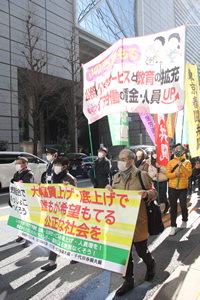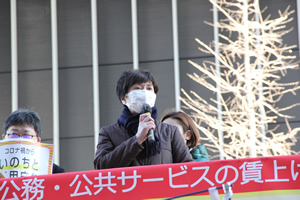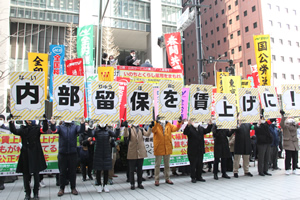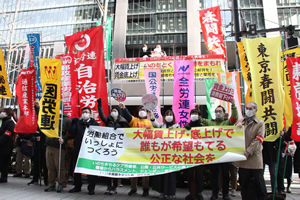Spring Struggle 2022 begins with action encircling Keidanren headquarters demanding big pay raises and 1,500-yen minimum wage
 Union workers converged on the headquarters of the Japan Business Federation (Keidanren) on January 13 to declare the start of the Spring Struggle 2022 after attending a rally in front of the Health, Labor and Welfare Ministry and marching in demonstration through the Marunouchi district where many large corporations have their head offices. Union workers converged on the headquarters of the Japan Business Federation (Keidanren) on January 13 to declare the start of the Spring Struggle 2022 after attending a rally in front of the Health, Labor and Welfare Ministry and marching in demonstration through the Marunouchi district where many large corporations have their head offices.
The participants from unions affiliated with the National Confederation of Trade Unions (Zenroren) and other organizations that are members of the National and Tokyo spring struggle committees demanded that a part of 459 trillion yen (about 4 trillion dollars) the large corporations have amassed in internal reserves be used to give a wage increase for all workers, including care workers, and that minimum wage be raised to 1,500 yen (about 10 dollars) everywhere in the country.
Zenroren President Obata Masako spoke at the rally in front of Keidanren. She said, “Japan is the only OECD country where wages have been in decline for more than 20 years even while the large corporations have been increasing their internal reserves.” She pointed out that women and contingent workers are the hardest hit in the face of the coronavirus pandemic and that year-end consultation and women’s consultation events attracted larger numbers of people than the previous year. She criticized Keidanren President Tokura Masakazu for stressing “growth-first” policy and being reluctant to respond to the workers’ demand for wage increase. She called for “fighting for social needs, including substantial wage increase, the establishment of employment rule to ensure that all workers can work in humane conditions, expansion and improvement of medical and public health systems, and for a society that is guided by the Constitution.” (The details of Obata’s speech are below.)
 Suzuki Toru, vice president of the Japan Metal Manufacturing, Information and Telecommunication Workers Union (JMITU) expressed his determination to fight through the Spring Struggle. He said, “Even though the companies are recovering their business performance, workers are yet to recover lost wages. We demand a substantial wage increase and shorter working hours.” Suzuki Toru, vice president of the Japan Metal Manufacturing, Information and Telecommunication Workers Union (JMITU) expressed his determination to fight through the Spring Struggle. He said, “Even though the companies are recovering their business performance, workers are yet to recover lost wages. We demand a substantial wage increase and shorter working hours.”
Ryuzmae Fusashi, a vice president of Zenroren-National Union of General Workers (Zenroren-Zenkoku-ippan) said, “Workers undergo torment as parent companies or order sources refuse to sit down at the bargaining table.”
Matsuzaki Miwa, a member of the Tokyo Federation of Medical Workers’ Unions executive committee said, “We will raise our voices from the workplace urging the government and the large companies with huge internal reserves to give pay raises.” Asano Ryuichi, the secretary-general of the Japan Federation of National Public Service Employees’ Unions (Kokko-roren), said, “Public service workers who are high school graduates receive starting salaries that are less than the minimum wage. We will win wage increase by joining forces with private sector workers.”
Labor talks over wages and working conditions are about to start. The unions are expecting to get management offer on March 9. Demanding a substantial wage increase and wage increase from the bottom up, Zenroren and the Joint Spring Struggle Committee will help unions go on strike and will organize social wage struggle calling for a minimum wage increase and the establishment of a uniform national minimum wage system. It will also focus on a wage increase and improvement of working conditions for medical workers, care givers, and childcare workers.
###
Speech by Zenroren President Obata Masako
At the protest action at the Japan Business Federation (Keidanren) headquarters
 I am Zenroren President Obata Masako. I’m speaking speak on behalf of the National Joint Spring Struggle Committee. I am Zenroren President Obata Masako. I’m speaking speak on behalf of the National Joint Spring Struggle Committee.
Zenroren and the Joint Struggle Committee in this year’s Spring Struggle put emphasis on the fight to win a substantial wage increase and wage increase from the bottom up. As everyone knows, Japan is the only OECD country where wages have been in decline for more than two decades. In most Western countries, even at the time of a crisis following the Lehman Brothers collapse, workers got pay raises in order to expand domestic demand to help get over the economic crisis.
But in Japan, the employers unilaterally terminated temporary agency workers’ contracts leading to the collapse of employment and imposed wage restraint to secure corporate profits as a way of “economic recovery.” This did not lead to people’s purchasing power recovery. The nation was stuck in a deep deflationary cycle.
In Western countries, minimum wages are being raised even in the time of the coronavirus pandemic. But in Japan, the average hourly minimum wage was raised by no more than 1 yen in 2020. In 2021, the workers’ movement effectively won a 28-yen increase. Still, the national average of 930 yen (about 8 dollars) is far from what we need. As a result, Japan’s GDP per capita has fallen to 23rd place in the world ranking from 2nd place 20 years ago.
But large corporations have continued to increase their profits. This means the workers have not got fair distribution of profit. Contingent workers and women workers have been the hardest hit.
The Internal Affairs Ministry’s labor force survey shows that in the first quarter of 2020, when the outbreak of the coronavirus started in Japan, the number of contingent workers fell by 90,000 from a year earlier. That was the first decrease in 32 quarters. The number of women contingent workers was down 100,000. The employment policy under the Liberal Democratic Party-Komeito government helped rapidly replace permanent employees with contingent workers. After the outbreak of the pandemic, contingent workers were first dismissed as “employment adjustment valves.” Women are conspicuously affected. The number of contingent workers declined through the first quarter of 2021. This is mainly due to the fact that there were many women among the contingent workers in wholesale, retail, hotel and food service sectors, which have been hardest hit by the coronavirus pandemic, and that there were many women who were forced to quit their jobs to take care of their children while schools, kindergartens, childcare centers were closed.
The daily Mainichi Shimbun on October 27 last year ran a report under the headline “Protracted pandemic-related unemployment rises rapidly among women leaving 340,000 without jobs.” It caught the eye of many people. According to the government labor force survey, the number of women who are out of work for six months or more remain high, as shown by the latest data. This shows that if a woman loses her job, she will have a tough time finding a new one.
 A consultation event for women by women was held on December 25 and 26, and January 8 and 9 by an organizing committee made up of members of women’s sections of Zenroren and other union organizations which participate in the Joint Spring Struggle Committee. A total of 382 consultations were held during the four days of the event. A consultation event for women by women was held on December 25 and 26, and January 8 and 9 by an organizing committee made up of members of women’s sections of Zenroren and other union organizations which participate in the Joint Spring Struggle Committee. A total of 382 consultations were held during the four days of the event.
It was reported that healthcare-related consultations increased. Many people, who came to the consultation event because they have difficulty making ends meet, also had health problems but were unable to consult a doctor due to their being jobless.
Those contingent workers and women workers, who are low-paid and have little savings, would lose all their source of income for a long period because of loss of jobs or business closings. They would even face a life-threatening situation as they cannot afford to buy food or may lose their homes.
Wages are indispensable for sustaining people’s living. The pandemic has revealed that the wages have fallen to levels that can hardly sustain life. The pandemic has brought to light how wrong it is to follow a policy of putting the interests of the financial circles first at the cost of the workers.
The need now is to narrow the income gap and raise from the bottom up wages that are too low to ensure that everyone can live a humane life.
Keidanren President Tokura Masakazu recently said, “The global trends of excessive capitalism and market force have had two main harmful effects.” He cited that they cause economic disparities to increase and become entrenched and even reproduced and that these distortions need to be corrected in the direction of “sustainable capitalism.” If he is really aware of these harms, he should sincerely face the workers’ demand and take steps to give a big raise from the bottom up.
But Mr. Tokura in his New Year message said that Prime Minister Kishida Fumio, who calls for “new capitalism, argues that distribution and growth should be discussed as a set and that growth should be put first. I would say that he is only following the fallacious trickledown theory of “Abenomics,” which has only helped to keep the wages of Japanese workers extremely low.
Business enterprises cannot work without workers. There can be no economic recovery is the same erroneous policy is repeated.
The Joint National Spring Struggle Committee met yesterday with representatives of industrial and regional federations to finalize the policy for Spring Struggle 2022. Our main slogan is: “Let us work together with the union to build an equitable society enabling anyone to have hopes for the future by winning a sharp wage increase from the bottom up.” We are calling for unions to join forces to raise voices for change all the more because we are in the midst of the pandemic.
We demand:
“Economic inequalities be solved and workers be given a big raise from the bottom up,”
“Jobs be protected and employment rules be established to ensure good working conditions,”
“Medical and public health systems be expanded and improved as well as the public services,”
“Society be guided by the Constitution and political change achieved through the upcoming House of Councilors election.”
I conclude my speech by sharing the determination with you to hold fast to these four demands and fight through in unity to win them in Spring Struggle 2022. Thank you all. |

